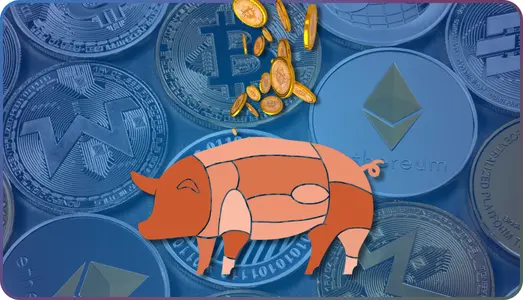Pig butchering scams have become increasingly widespread across the world. According to this study, an estimated global loss of USD 75 billion has been recorded since the emergence of pig butchering scams in 2020, and the numbers keep growing.
Pig butcher scammers fake friendships or romantic connections with their victims to “fatten” them up emotionally and then “slaughter” them financially.
Pig butchering scams: a fairytale love story or a true crime?
Don, not his real name, is a 59-year-old widower from Johannesburg who received a message from a woman on Facebook that said, “It was nice meeting you, Don! Shall we meet again next week?”
Don replied and said he had not met with her before, to which the woman, named Lauren, apologized. She said she must have messaged the wrong person but was pleased to have messaged Don either way.
Lauren said she was from the Western Cape, and they shared the same interests in film and cycling.
The two exchanged texts and photos for weeks, and while Don wanted to meet her, the woman was always out of town—on a business trip in Singapore, on a vacation in the Carribean, or attending a friend’s wedding in Italy.
Her messages were always accompanied by photos of her in the most luxurious resorts and hotels, riding sports cars, and other excessive displays of wealth.
Don, a retired engineer, was already a bit skeptical about Lauren’s existence. She seemed too good to be true, too rich and too beautiful to be wasting time on a retiree.
When confronted about her finances, Lauren said she used to be an office secretary until she became a crypto miner, which now funds her extravagant lifestyle. She said she could teach Don how to do it.
Don was instructed to download a crypto wallet app and send screenshots to Lauren, and he received further instructions on how to deposit money into the account.
At first, Don deposited R20,000. Within 2 days, he watched his money “grow” on the app, and Lauren told him he could withdraw his earnings of R10,000. So he did, and the withdrawal went smoothly.
Convinced of the profitability and eligibility of this “investment,” Don re-mortgaged his house (even though he was close to paying it off) and deposited all his savings into the account within a year.
All of a sudden, Lauren said she was diagnosed with cancer and that she couldn’t talk with Don anymore. She blocked him everywhere, and Don could no longer contact her.
Related: Investment Ponzi Scheme in South Africa: What It Is and How to Avoid It
When he tried to open the crypto wallet app, it displayed a page that said “under maintenance” and he could no longer access his funds or “investments.”
With a broken heart and an empty bank account, Don realized he had been victimized by a pig butchering scam. This type of digital fraud targets basically anyone with money, from young professionals to retirees.
What are pig butchering scams?
A pig butchering scam is a complex online scam that lures victims into fake investment schemes, often involving cryptocurrency. Scammers do this by “fattening up” or building an emotional relationship before mentioning investment opportunities.
Much like what happened to Don, scammers lure victims through romance, friendships, or posing as credible businessmen. Sometimes, they can also claim to be an executive from a prestigious bank or financial institution.
The term “pig butchering” originated from its Chinese term, “shāzhūpán”, where scammers “fatten” up their victims emotionally before “slaughtering” them financially.
Difference between pig butchering and romance scam
Pig butchering scams and romance scams are very similar. Also known as forms of “social engineering” scams, both involve building a fake emotional connection with their victim and exploiting them emotionally and financially.
However, a pig butchering scam takes longer because it combines romance scams and investment fraud to steal as much money as possible.
Meanwhile, a romance scam takes less time to accomplish. A romance scammer will quickly establish a romantic connection with their victim and then create an emergency or hardship that requires urgent financial solutions.
For instance, a scammer might say that their mother suffered a heart attack and needs to be operated on right away but doesn’t have the money to pay for it. The victim will send money, while the scammer will continue to ask for money until the victim becomes suspicious or runs out of funds.
How do pig butchering scams work?

Pig butchering often involves “social engineering” that combines trust-building and fake investment opportunities.
In an article from Forbes, they outlined how this scam typically unfolds:
Scammer’s initial contact
A scammer will contact a potential victim via text, social media, or dating apps.
They often start with a simple “hi” or a wrong-sent message such as “Hi, is this Emy? We met at the diner last month.” The victim, trying to be polite, will respond, creating a gateway for further communication.
Scammer builds trust
The scammer will try to gain the victim’s trust over the course of weeks, months, or even years.
They might send daily good morning messages, flirt and romance the victim, love bomb them, or pose as a successful, trustworthy individual.
Scammers often have a script or playbook to follow, outlining responses for different demographics, timelines, and responses. For example, there is a different script when talking to a woman in their 20s or a man in their 50s.
Scammer introduces crypto investments
Around two weeks later, the scammer gradually mentions their successful investment background and offers to help their victim reach the same affluence.
They often show “proof” through fake photos (usually AI-generated) to appear legit.
The scammer could say, “I just made a 50% return in a week. I’m happy to teach you, but only if you’re comfortable with it.”
The scammer will then ask the victim to go on an online platform or download a fabricated app to appear legitimate and trustworthy.
Pig butchering scams are double-edged
Stephanie Baroud, a criminal intelligence analyst at Interpol, told Wired.com that the pig butchering scam is “double-edged.”
Organized crime syndicates will kidnap job seekers and force them into labor as pig butchering scammers.
People from more than 60 countries have been abducted and trafficked to scam compounds that operate with thousands of forced workers.
According to the United Nations, they found that “dormitory style bedrooms were constructed in complexes; scammer training manuals were created; enforcers were hired to control trafficking victims; and the mass recruitment of trafficking victims began.”
“We can already see the damage and the human cost both to scam victims and to forced laborers,” said Michael Roberts, founder of Rexfield Cyber Investigations, told Wired.com.
In a report from ABC News, a 36-year-old South African woman under the pseudonym Sara, was trapped in a scam compound in Myanmar for nine months after applying for a customer service job in Thailand.
Sara told ABC News she was interviewed for the job multiple times and given a round-trip plane ticket. When she arrived in Thailand, she was greeted by gunmen, escorted to a boat, and then taken across the border to a scam compound.
She was only able to leave when a fellow victim who had escaped months ago helped pay for her “ransom,” or the fee you had to pay to get out.
Read more: What is a crypto boiler room and how to protect yourself?
Stephani Baroud, a criminal intelligence officer at Interpol, said, “This trend has really become a global crisis.”
Baroud adds that the pig butchering scam has “two different sets of victims, those who are trafficked on the one side, and those who are scammed of large sums of money on the other side. And it’s true that victims on both ends of this trend have really dealt with a lot of repercussions.”
How to protect yourself from pig butchering scams
Institutions around the world have increasingly warned the public about this threat.
In South Africa, banking group Capitec outlined pig butchering as the most prevalent scam targeting its consumers in 2024.
The South African Baking Risk Information Centre (SABRIC) also saw a sharp rise in push payment fraud, with incidents up by 40% from 2023.
Authorities and banks urge the public to stay vigilant to protect themselves from this growing threat. Institutions, researchers, and previous victims have advocated that the primary safeguard against pig butchering scams is education. If people understand how these scams work, telltale signs, and red flags, they are less likely to be victimized.
Here are some practical ways that individuals can protect themselves from pig butchering scams and similar schemes.
- If it sounds too good to be true, it likely is. Never accept offers that promise quick or high returns.
- Avoid paying upfront fees for jobs, loans, or prizes.
- Research any investment opportunities thoroughly, consult friends, family, and other credible investors through verified communities, and always check if they are regulated by the proper authorities.
- Do not entertain unsolicited calls or messages, especially if they offer unlikely investment opportunities.
- If a friend, coworker, or relative offers you an investment opportunity, help them verify their investment.
- Help educate others and inform them about scams such as pig butchering.
Stay Ahead with CommuniTrade
Be on top of trading news, industry insights, and market analysis with CommuniTrade. Dive into discussions, verify facts, and connect with a network of only verified traders.

















